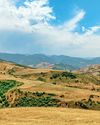
ON SATURDAY, 14 MARCH, 2020 the day after public schools and our twin three-yearolds' daycare closed in our town in New York's Hudson Valley due to the Covid-19 outbreak, I sent the kids to their sitter one final time, frantic for a couple hours to get a few things done before I turned myself over to motherhood, all day, every day, for the foreseeable future.
There were piles of laundry to do, a shopping list that needed tending, urgently. But I found myself drawn out into the garden, still covered with mulch for its wintry slumber. Poking around, I saw early signs of life; the rhubarb had poked its rippling, fuchsia crowns out of the damp earth, and the tiny frills of wild nettles were several centimeters high in the rangy, untended back corner. The chives, too, had suddenly shot up in the preceding days’ warmth. It seemed too early, I thought, running back in my mind over all my years of planting. But then, this was the winter that never was, the deep freeze that never came. The unease has been around us for months now. The geese came home early, turtles are resting on logs already, the frogs out in the beaver pond the first week of March: a full month ahead.
I wasn’t ready, but the earth was ready; the plants were telling me so. So I pulled my box of seeds from the kitchen shelf. Out back in the shed, I wrangled a sharply-tipped hoe from behind a mess of bikes and lawn chairs. In the garden, I knelt over a bed, pulled aside the browned grass clippings from the last mowing of the fall, made two shallow rows, and dropped seeds into the ground—tiny, almond-shaped lettuce seeds and those of kale and collards, like burgundy poppy seeds. It might be too early, I thought as I sprinkled the harbingers of life into place, but it’s worth a shot. Anything hopeful, right now, is worth a shot.
This story is from the {{IssueName}} edition of {{MagazineName}}.
Start your 7-day Magzter GOLD free trial to access thousands of curated premium stories, and 9,000+ magazines and newspapers.
Already a subscriber ? Sign In
This story is from the {{IssueName}} edition of {{MagazineName}}.
Start your 7-day Magzter GOLD free trial to access thousands of curated premium stories, and 9,000+ magazines and newspapers.
Already a subscriber? Sign In

Demonstrators by Krishna Reddy
1968 Multicolour viscosity, Print on paper

Notes from Grief Camp
Every summer, more than a hundred children come together to spend a weekend swimming, climbing and canoeing. They also learn to deal with death

Six Places Cheese Lovers Should Visit
Ancient caves, monasteries, and other must-sees for fromage fans

THE LAND OF SUPERCEN TENARIANS
A remote region of Azerbaijan claims to have many extremely long-lived residents. What is their secret, or is it just a myth?

The Whistle Blowers
My grandparents had a distinctive way of communicating

"THE NEXT AIRCRAFT WILL CRASH ON LANDING"
THE JET WAS ALMOST OUT OF FUEL. THE PILOTS' ONLY OPTION WAS A MANOEUVRE NO ONE HAD EVER ATTEMPTED.

The Secrets in our Genes
Genomic sequencing tests can reveal much about your unique physiology. But are they worth it?

GOOD NEWS FROM AROUND THE WORLD
MENTAL HEALTH When her son was arrested last year, Tambudzai Tembo's mind went to dark thoughts of suicide.

Into the Inferno
A gas station owner has seconds to react when a car crashes into a gas pump

THE CLIMATE CHANGERS
THESE PLACES ARE LEADING THE WAY TO A FUTURE FREE OF FOSSIL FUELS